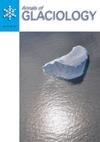潮水冰川推进对冰山栖息地的影响
IF 2.1
4区 地球科学
Q2 GEOGRAPHY, PHYSICAL
引用次数: 0
摘要
冰前峡湾中的冰山是阿拉斯加一些最大的季节性港湾海豹(Phoca vitulina richardii)的繁殖、休息和蜕皮栖息地。阿拉斯加东南部最大的聚集地之一发生在冰川湾国家公园的约翰斯·霍普金斯湾,那里有多达2000只海豹使用约翰斯·霍普金斯冰川产生的冰山。与其他正在推进的潮水冰川一样,约翰斯·霍普金斯冰川在过去一个世纪的推进得益于海底端冰碛的生长和持续重新分布,这限制了冰山崩解和海底融化造成的质量损失,并通过提供流动阻力使冰川增厚。一份15年的航空调查记录显示,(i)冰山浓度下降与冰碛生长同时发生,(ii)冰山大小分布可以近似为幂律分布,尽管冰通量在季节和年际尺度上发生了很大变化,但变化相对较小,幂律指数没有明显趋势。总之,这些观测结果表明,潮水冰川的持续推进通常与大型宜居冰山数量的减少有关,这可能会对依赖冰山栖息地进行关键生命史事件的海豹产生影响。本文章由计算机程序翻译,如有差异,请以英文原文为准。
Impacts of tidewater glacier advance on iceberg habitat
Icebergs in proglacial fjords serve as pupping, resting and molting habitat for some of the largest seasonal aggregations of harbor seals (Phoca vitulina richardii) in Alaska. One of the largest aggregations in Southeast Alaska occurs in Johns Hopkins Inlet, Glacier Bay National Park, where up to 2000 seals use icebergs produced by Johns Hopkins Glacier. Like other advancing tidewater glaciers, the advance of Johns Hopkins Glacier over the past century has been facilitated by the growth and continual redistribution of a submarine end moraine, which has limited mass losses from iceberg calving and submarine melting and enabled glacier thickening by providing flow resistance. A 15-year record of aerial surveys reveals (i) a decline in iceberg concentrations concurrent with moraine growth and (ii) that the iceberg size distributions can be approximated as power law distributions, with relatively little variability and no clear trends in the power law exponent despite large changes in ice fluxes over seasonal and interannual timescales. Together, these observations suggest that sustained tidewater glacier advance should typically be associated with reductions in the number of large, habitable icebergs, which may have implications for harbor seals relying on iceberg habitat for critical life-history events.
求助全文
通过发布文献求助,成功后即可免费获取论文全文。
去求助
来源期刊

Annals of Glaciology
GEOGRAPHY, PHYSICAL-GEOSCIENCES, MULTIDISCIPLINARY
CiteScore
8.20
自引率
0.00%
发文量
0
审稿时长
>12 weeks
期刊介绍:
Annals of Glaciology publishes original scientific articles and letters in selected aspects of glaciology-the study of ice. Each issue of the Annals is thematic, focussing on a specific subject. The Council of the International Glaciological Society welcomes proposals for thematic issues from the glaciological community. Once a theme is approved, the Council appoints an Associate Chief Editor and a team of Scientific Editors to handle the submission, peer review and publication of papers.
 求助内容:
求助内容: 应助结果提醒方式:
应助结果提醒方式:


